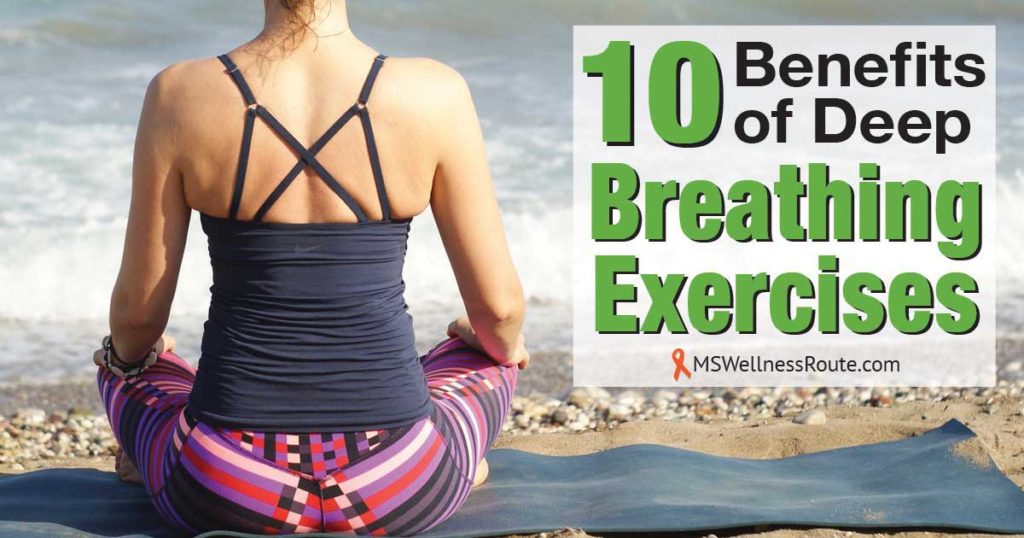Last Updated on January 27, 2025 by Cathy

Deep breathing exercises are easy to do and they have many benefits for your health. Pay attention to how you are breathing right now. Are they long deep breaths or short quick breaths?
There are two ways we breathe, one is through the chest and the other through the abdomen. Chest breathing is shallow and doesn’t have as many benefits as deep breathing. Unfortunately, we have gotten into the habit of taking short, quick breaths.
When negative emotions are running high your breathing pattern changes. If you find yourself always stressed then you probably aren’t breathing deeply. Paying attention to your breathing patterns it can help you relax and lower your stress.
Several years ago I read an article about the importance of deep breathing. That’s when I started making it a point to take several deep breaths each hour. I saw an improvement in my anxiety, stress level, and sleep.
Deep Breathing Benefits
Deep breathing didn’t come naturally to me, I had to consciously make an effort. At first, I would forget, by the time I finally remembered I realized I was taking short quick breaths again. You may find yourself doing the same thing.

Deep breathing benefits:
- Brings in fresh oxygen
- Calms anxiety, nerves, and stress
- Central nervous system
- Improve attention span
- Improves blood oxygenation
- Increases melatonin
- Insomnia
- Lower pain levels
- Lowers cortisol
- Lowers oxidative stress
- Slow your heart rate
- Reduce blood pressure
- Remove toxins
- Respiratory system
Make a point to take several deep breaths each hour. You may need to set your alarm to remind yourself at first. Give it a try! Close your eyes take a slow deep breath through your nose and hold it for a few seconds. Then, let it out slowly through your mouth. Can’t you feel the tension leaving your body?
10 Benefits of Deep Breathing Exercises

When you start taking deep, slow breaths your body benefits in many ways. Breathing eliminates 70-75 percent of the body’s toxins. If you aren’t taking deep breaths your body is working harder to remove the toxins.
1. Reduces Stress
Stress plays a huge factor in multiple sclerosis (MS). It can be the underlying factor that triggers the onset of MS plus it can trigger a flare. Whether it’s from emotional feelings or physical pain the body responds the same.
Years of chronic stress are what set me back and caused my walking to get worse. It took me a long time to learn techniques to manage my stress. It’s not necessarily the stress itself, it’s how you emotionally react to the stress.
You may experience a rapid heartbeat, upset stomach, or muscle tightness. On top of short quick breaths. Once you start experiencing stress your body starts pumping out cortisol and adrenaline.
You’ve probably been doing this for a long time, possibly for many years. It’s become a habit and habits are hard to break. Learning to take slow, deep breaths is an important factor for improving your health.
Stress can lead to:
- Anxiety
- Autoimmune diseases like MS
- Brain fog
- Depression
- Flares
- Insomnia
- Heart disease
- Hypertension (high blood pressure)
- Indigestion
- Infections
- Stroke
You can’t always avoid stress but you can learn how to manage it. Deep breathing exercises can help manage stress and negative thoughts.
2. Reduces Anxiety and Depression
We live in a very highly stressed world which can take a toll on your health. Deep breathing exercises help by giving you a sense of calmness. Take a few minutes each day to focus on your breathing and bring calmness into your life. For more help check out How to calm anxiety (when you’re freaking out).
3. Detoxifies the Body
Deep breathing stimulates the lymphatic system which detoxifies the body. It also protects us from bacteria, infections, and fungi. If the lymphatic system isn’t working properly it can lead to illnesses.
4. Deceases Pain

Endorphins are the feel-good hormones that help to lower your perception of pain. Each time you take a deep breath it releases endorphins making you feel more relaxed. Taking deep breaths even helps manage physical pain. Pregnant women use deep breathing to manage pain as they go into labor.
5. Improves Immunity
Deep breathing boosts your immune system to protect you. It helps you heal from infections and viruses. It also carries more oxygen to your blood. This helps transport vital nutrients more efficiently.
6. Improves Digestion
Deep breathing stimulates the vagus nerve which connects all organs of the body. It’s the gut-brain connection. Plus it improves blood flow improving your organ and digestive system.
7. Muscles relax
As you take several deep breaths you can feel the tension falling and your muscles relaxing. Relaxation helps manage MS symptoms like depression, fatigue, pain, sleep issues, and stress.
It also helps with muscle spasms and spasticity which are both common MS symptoms. As you start to feel more relaxed it also relieves the tension in your muscles. When your muscles are more relaxed it allows your body to move more freely.
8. Lowers Blood Pressure

Deep breathing lowers your heart rate which lowers your blood pressure. As your breathing becomes slower your body becomes more relaxed. I practice deep breathing just before I get a blood pressure test. And it works, my blood pressure is always low even when I’m nervous.
9. Improves Brain Function
Deep breathing benefits brain function. When you’re stressed or nervous your thinking becomes cloudy. By taking deep breaths it brings oxygen into your body which is good for your brain. The brain needs oxygen to function properly.
That’s why you often see athletes taking several deep breaths just before a competition. It calms the nerves, relaxes muscles, and clears your head.
10. Fall Asleep Faster
Do you ever lay in bed for hours trying to fall asleep but you keep looking at the clock instead? It’s no joking matter. Lack of sleep can make MS symptoms worse which could cause a tripping accident and broken bones.
I can’t tell you how many nights I’ve spent trying to fall asleep and then hearing the alarm go off too soon. Since my balance was off, I would struggle to get to the bathroom without falling over. Then I discovered Dr. Andrew Weil’s 4-7-8 breathing technique and I’ll be darn if it didn’t work.
Dr. Andrew Weil’s breathing technique:
- Close your mouth and inhale through your nose counting to four.
- Hold your breath for a count of seven.
- Exhale through your mouth as if you were blowing out a candle and count to eight.
Repeat these three steps a total of four times. This exercise is a natural tranquilizer for the nervous system. Fortunately for me, I’m usually asleep before I finish this exercise.
Unlike sleep medications, this exercise becomes more effective over time. Sleep medications work at first but then lose their effectiveness over time. Don’t do more than four breaths in the first month. Afterward the first month you can increase it up to eight breaths if needed.
“Deep breathing is a powerful tool in combating insomnia compared to pharmaceutical interventions.” – PubMed
Benefits of Deep Breathing Exercises
Practice deep breathing exercises throughout the day. Practice every day not only to fall asleep but for many health benefits. If you’re not taking deep breaths you’re missing out on a simple way to improve your health.

Free Wellness Library!
Subscribe for free and I’ll send you the password to my secret library filled with many printables for your wellness journey.
Want to remember this health tip? Pin it to your favorite Pinterest board!

Resources:
https://www.ncbi.nlm.nih.gov/pmc/articles/PMC6361823/
https://mymsaa.org/ms-information/symptoms/spasticity/
https://www.drweil.com/health-wellness/body-mind-spirit/stress-anxiety/breathing-three-exercises/
Photos courtesy of: pixabay.com and unsplash.com





